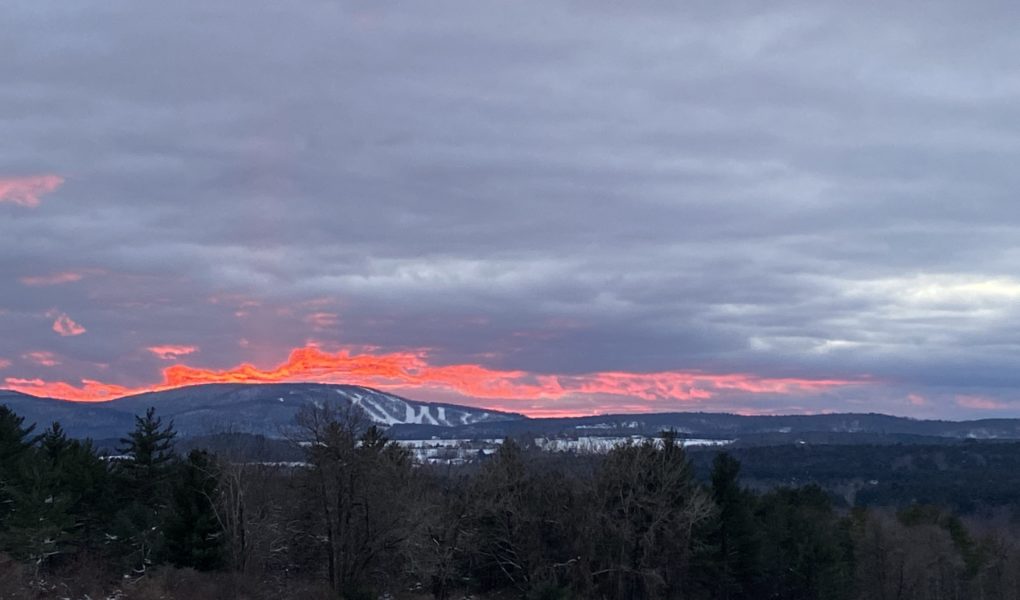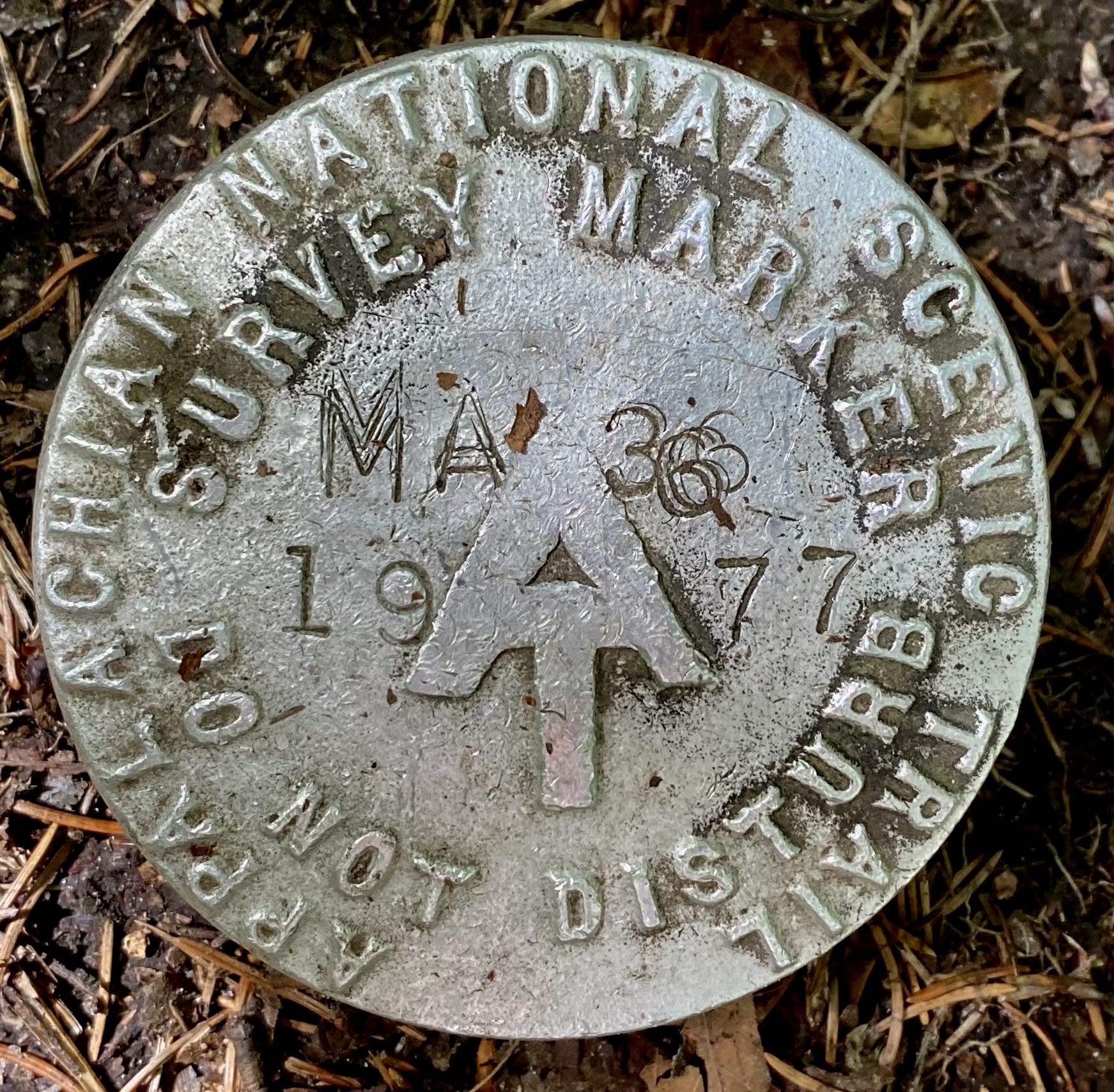This is a story in which nothing happens. but much could have… and that’s what I want to share.
A couple of weeks ago, you would have found me hiking up the Jug End on the Massachusetts Appalachian Trail at 8:30 in the evening, in the quickly falling dark. I carried a stick I had found on the forest floor to which I had rigged a battery-operated musician’s light. (Reason: I hadn’t been able to quickly find a headlamp, and I needed to be quick). I was not carrying raingear (it wasn’t going to rain) and I wasn’t carrying warm clothes (it wasn’t cold — yet; that would change as the night wore on). I did have an orange and a pint of water in a shoulder pack slung across my back. I had not left a note on my car, and I had left no word at home where I was going. And, if you know the AT: It’s steep and rocky, and here in Massachusetts in late August, it’s getting dark earlier every day.
So right about now, you are (I hope) wondering: What did she think she was doing, and why the heck am I taking advice on hiking from THIS woman?
The Phone Call
Here’s what happened: At about 8 p.m., I got a call from an AT thru-hiker who had been planning to stay the night at my house. I had been expecting to pick her up at the trail about two hours earlier, so I was relieved to hear from her. But then she told me she was feeling ill, and she was still up high on the Taconic Ridge. The trail up there is one of those boulder-strewn ups-and-downs that makes for slow going, even for a fit thru-hiker 1,500 or so miles into the hike. She was calling from her cell; she didn’t know exactly where she was or when she would be down and dusk was falling. I, on the other hand, knew what lay between where she was the top and where she needed to get to: a couple of miles of steep rocky scramble. And I was worried.
First of all, she was hiking alone. And second, she was “slackpacking” and didn’t have much (or really, anything) in the way of gear. I had met her earlier that morning at the trailhead and I’d taken her pack to my house so she could hike unencumbered for a day. She had a rain jacket, but no flashlight. And she certainly didn’t have what she needed to spend the night. With dark falling so quickly, she might not have enough light to get out.
When you’re exhausted and it’s dark, the descent off Jug End is about the last place on the entire Massachusetts AT you want to be. So I told her I’d drive over to the trail (It’s about five minutes from my house) and start hiking up to meet her.
My hiking stuff was in total disarray: I knew where my boots were, and that was about it. I’m not the most organized of people at the best of times, but my hiking stuff had been displaced by a home renovation project; no way was I going to be able to find a headlamp quickly (let alone a working one with the right sized batteries). And as luck would have it, our house emergency flashlights — the ones we keep around for power outages — all seemed to have come down with some type of flashlight illness… dead batteries, rusty contact points, etc. So I grabbed the one light I did have handy: a four-LED-bulb musician’s light — the kind orchestra players use to light their music stands. And I headed out.
Driving to the trail, I couldn’t help but notice how quickly night was falling, and how very dark the woods looked. I parked at the trail head, and as soon as I started into the woods, I immediately realized that heading onto a dark trail in the fast-falling night was with no gear and a tiny music light was not an ideal situation. I especially missed my walking sticks, which I’d simply forgotten — they live right by the front door, so there’s no excuse for that. But trail magic is pretty reliable, and an obliging hiker had left a perfect stick right on the trail. I clipped the base of the musician’s light to it.
But I didn’t turn it on: There was a full moon, and I’ve found with night-hiking that your eyes can often adjust. Until you really need artificial light, you can be better off without it. Although it was dark, I could pretty much feel the trail underfoot; every once in a while I caught a glimpse of white blazes, which seemed to briefly catch the moonlight through the pines. I made sure I always noted where the blazes were, because it’s easy to wander off on an animal trail. However, luck was with me again, as this part of the trail is frequently marked. Plus, once you start climbing, it’s on a pretty steep ridge: There isn’t really anywhere else to go.
Night-Hiking
It was actually a nice walk: perfect temperature, clear night, no bugs, quiet and peaceful. I settled into a moderate rest step, and climbed about half an hour before it got too dark to pick out the blazes anymore. All the while I was wondering just what exactly I thought I was doing: If the hiker had been injured, I wasn’t carrying anything useful except for water and an orange. The most I’d be able to do would be go back down for help. Or, I could get myself into trouble in the dark and become a second problem for someone else to solve. I walked carefully, and slowed down on the rocky bits. I had deliberately not left a note at home because I didn’t want to worry my partner. That was (very) arguably a dumb move, but my partner isn’t a hiker, and I didn’t want him freaking out and calling the volunteer fire brigade just because it was dark. It seemed like a good decision at the time, but as I continued uphill, it started sounding dumber and dumber, even in my own mind.
Finally, after I’d been walking close to a half an hour, It was fully dark. When I could no longer see any hint of a blaze, I turned the light on, and shone it up the mountain, hoping it could be seen from above. Sure enough, I heard a yell, from quite a ways up. I resisted the temptation to call out “Dr. Livingstone, I presume” and continued the climb.
When we met, my friend was relieved; she’d been thinking of simply sitting down and waiting for me, but she didn’t know how far she still had to go, or how long it would take me to get to her, or how cold it would be by then. We walked back down together, me carrying the light above both of us like a camera man’s lighting assistant. We looked ridiculous.
And that was that: No drama, no real problems. It may have been another 20 minutes till we got back to the truck. We drove home, ate a lot of food, and slept.
Lessons From a Non-Event
But I thought this little story of a non-disaster worth sharing because it has an alternate ending. Rain would have made the descent frankly dangerous. A fall could have left my friend somewhere off trail, in need of search and rescue. One, or both of us, could have lost the blazes and wandered into trouble. It did get cold later that night, cold enough that the tree frogs stopped yammering. Cold enough that a stranded hiker might have become hypothermic.
Bad luck can happen, even to a thru-hiker with thousands of miles of experience. My decision to race the darkness and head up the mountain quickly is questionable. A few minutes minute have been well-spend to find better lighting, a bit more food, trekking poles, and some extra clothes. It seemed like the right thing to do — to try and get myself and my light up the mountain as far and fast as possible. It turned out to be the right choice… but it might not have been.
Most of us are able to learn from our own experiences. It takes real brilliance to learn from other people’s disasters. But it takes something else — perhaps imagination — to learn from what could have happened to someone else — and didn’t. Not to say “Well, everything worked out and was great” but “What can I learn from what didn’t happen.”
Please imagine.
As for us: I’m pretty sure next time my friend slackpacks, there’s going to be a headlamp in her daypack. For my part, it wouldn’t hurt to have a first aid kit and a little daypack containing the ten essentials on hand. Plus fresh batteries.
As it turned out, we had a power outage in the house that night …. and the piano light, still tied to the make-shift walking stick, was pressed into service again.

